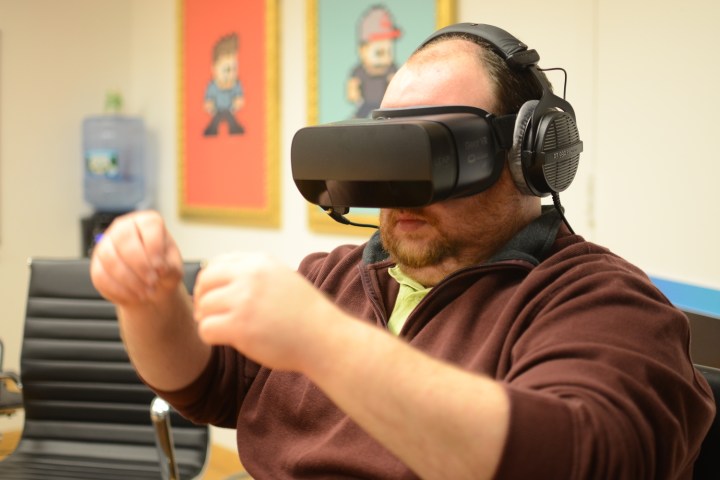
Leap Motion’s new Mobile Platform uses a new sensor, and the company says it “reinvented” its Orion software to run at nearly 10 times the speed. Performance is also “smoother and more accurate” than ever before, it says. The new sensor is a small strip that can be embedded into mobile head-mounted displays — in fact, Leap Motion CEO and President Michael Buckwald, CTO and co-founder David Holz, and Caleb Kruse, chief of staff, gave us a whirl with a modded Samsung Gear VR.
We were dropped into a virtual world, and once we lifted our hands, we could see them virtually — no controller necessary thanks to the tracking technology. Holz says making sure mobile phones could handle the technology without burning a hole through the headset was important.

“That’s one of the reasons we wanted to make a new piece of hardware to make it much lower power, because if it takes up a lot of power, it’s just going to destroy the phone instantly,” Holz told Digital Trends. “Our peripheral was already lower power than anything else in the world — we made it half the power of that.”
In addition to halving the power needed, Holz says the team also adjusted the range, so taller people could still have their hands tracked at varying distances. The field of view in VR has also been increased from 140 x 120 to 180 x 180 degrees.
The tracking technology is impressive — it’s able to accurately imitate intricate movements of the hand because it tracks every single joint in the hand all the way down to the elbow. The demo allowed us to create blocks with our hands, and it felt natural interacting with them. You can flick them, throw them in the air, catch them, and do just about anything you’d expect to with your hands in the physical world. There were some kinks and some of the blocks seemed to stick to our hands, but Holz said the team is still improving the platform.
Leap Motion is licensing the sensor to “several” headset manufacturers, and Holz hinted that we may see more all-in-one headsets — ones that don’t require a mobile phone to power them — in 2017. The company says it will demo the new platform with the Gear VR to the public at VR events in “many major cities.”

